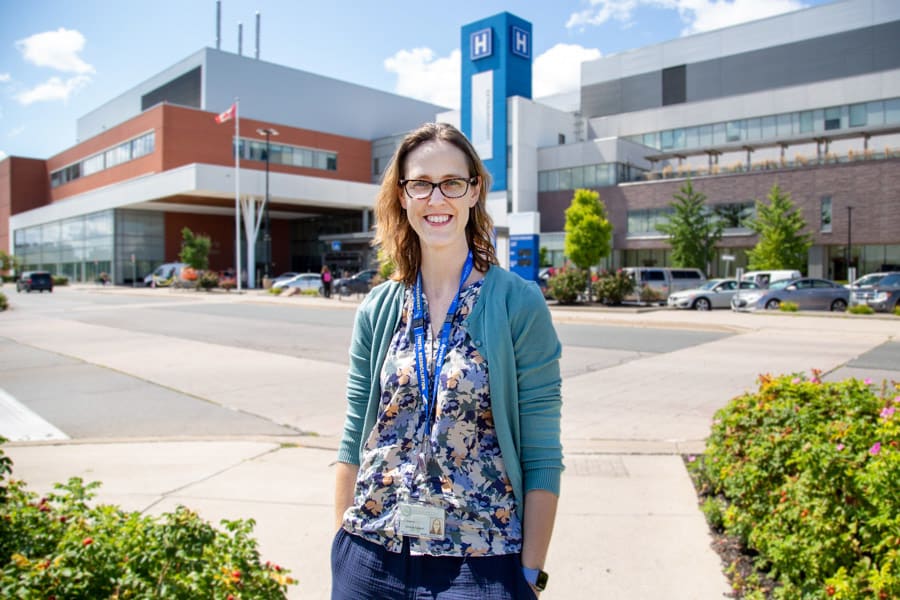We are Niagara Health is a series of stories that celebrates the incredible people working and volunteering in our organization and how they make a difference in the lives of patients and coworkers every day.

Dr. Stephanie Phillips is Niagara Health's first-ever ambulatory physician lead. She will help lead the redesign of ambulatory services at all three Niagara Health hospitals.
Dr. Stephanie Phillips knows that transforming care can start with a simple text message wishing a fellow surgeon happy birthday or just checking in to see how a colleague is doing.
It builds good will and connection – both of which Dr. Phillips, a general surgeon and Surgical Site Lead for the Marotta Family Hospital in St. Catharines, has needed in her role the past few years as she’s helped change surgical services and patient care for the better.
Now as Niagara Health’s first-ever ambulatory physician lead, tasked with gleaning physician input and gaining their buy-in for the redesign of ambulatory services at all three hospitals, Dr. Phillips is building her contact list to send even more friendly messages and strike up further rapport with her coworkers.
“That goes a long way to building relationships,” Dr. Phillips says. “My leadership philosophy is about building relationships because that’s how you accomplish things.”
She’ll have a lot to achieve on her to-do list over the next two years, which is the length of her new post.
Ambulatory care means a patient walks into the hospital for their procedure and leaves the same day. That includes services such as minor surgery, visits to the fracture clinic to help with broken bones, day-stay procedures, such as endoscopy, pre-operation clinics, and infusions.
With the new South Niagara Hospital on the horizon, Dr. Phillips will not only determine which ambulatory services need improvement now, she’ll also start looking ahead to improvements that can be made when the new hospital opens in 2028.
In the meantime, her role, which started in August, will be to get surgeons and physicians on board with any modifications and “smooth the changes as we go.”
“We have problems now that we need to fix, we can’t wait five years for the new hospital to be built,” Dr. Phillips says. “When we move to the new hospital, we’ll have more exam space and more physical space to work with. The challenge will be coming up with the ideal solution that will work once the new hospital is built, and then figuring out how to make it work in our current setup.”
"The landscape is changing and just because this is how we’ve done it for 30 years doesn’t mean we can’t change it. And if we can change it for the better for patients and physicians, that’s really exciting for me.”
Given about two-thirds of the surgery Dr. Phillips performs is ambulatory, becoming the ambulatory physician lead was a natural fit. She’s also a veteran of implementing change to transform patient care for the better.
Take one of her proudest accomplishments. In 2022, Dr. Phillips led the charge on establishing trauma rooms to improve care for patients coming into the Emergency Department (ED), who required surgery for issues such as hip fractures, appendicitis, or bowel obstructions.
Before the advent of trauma rooms, surgeons scheduled procedures Monday to Friday during regular operating hours. After 5 p.m. and on weekends, they would begin to work through the list of emergency cases. But, Dr. Phillips says, that wasn’t an efficient way to help patients in the ED.
“We have too many patients to do that,” she says. “You can’t provide good care to people when you have 30 patients needing surgery in the Emergency Department and only three are getting done per day.”
With some re-jigging of schedules and tapping into those relationships she’d already built, Dr. Philips helped to implement new protocols that see a general, orthopedic and vascular surgeon dedicated to emergency surgeries three days a week at St. Catharines. The plan is to eventually increase to five days a week, like at the Niagara Falls Hospital.
“Establishing our trauma rooms here has made a big difference to care for emergency patients,” she says. “It’s making the operating rooms more efficient, it’s organizing time, it’s working with surgeons to make that process work. That’s my jam. These are the projects that I like.”
So she’s eager to get going on this next big assignment, which she’ll undertake with Laura Morrison, Director of the Ambulatory Program, and aligns with Niagara Health’s strategic plan and three-site model.
Although she’s only just begun, Dr. Phillips, who has been a key physician representative in the existing ambulatory review process, notes that some services need more help than others. A governance committee will take ideas from physicians and make decisions using patient feedback and data to support changes that she says will benefit everyone involved.
“We get stuck in the historic, this is how we have always done it,” Dr. Phillips says. “But the landscape is changing and just because this is how we’ve done it for 30 years doesn’t mean we can’t change it. And if we can change it for the better for patients and physicians, that’s really exciting for me.”

